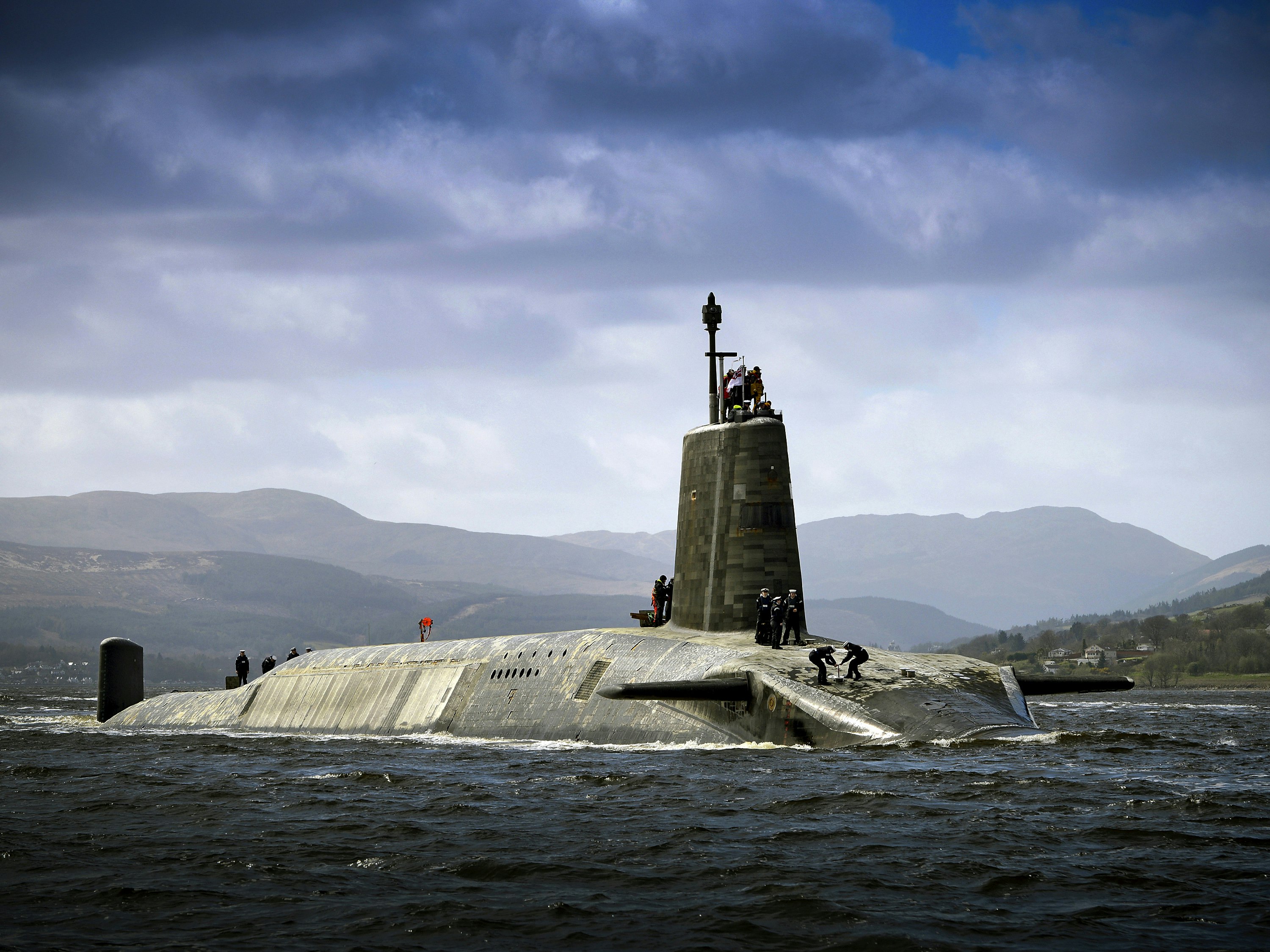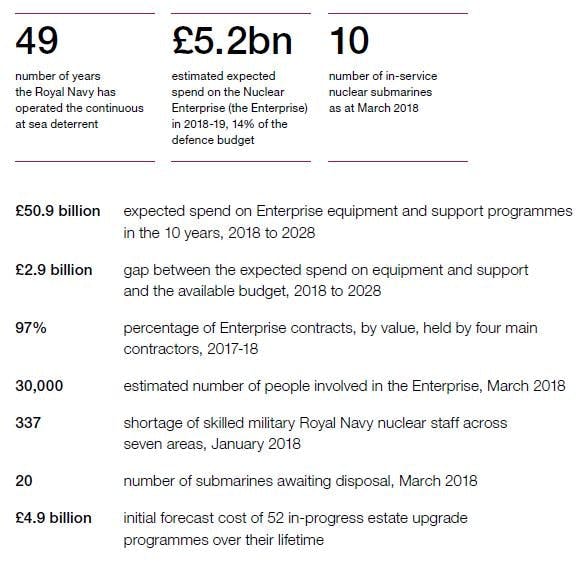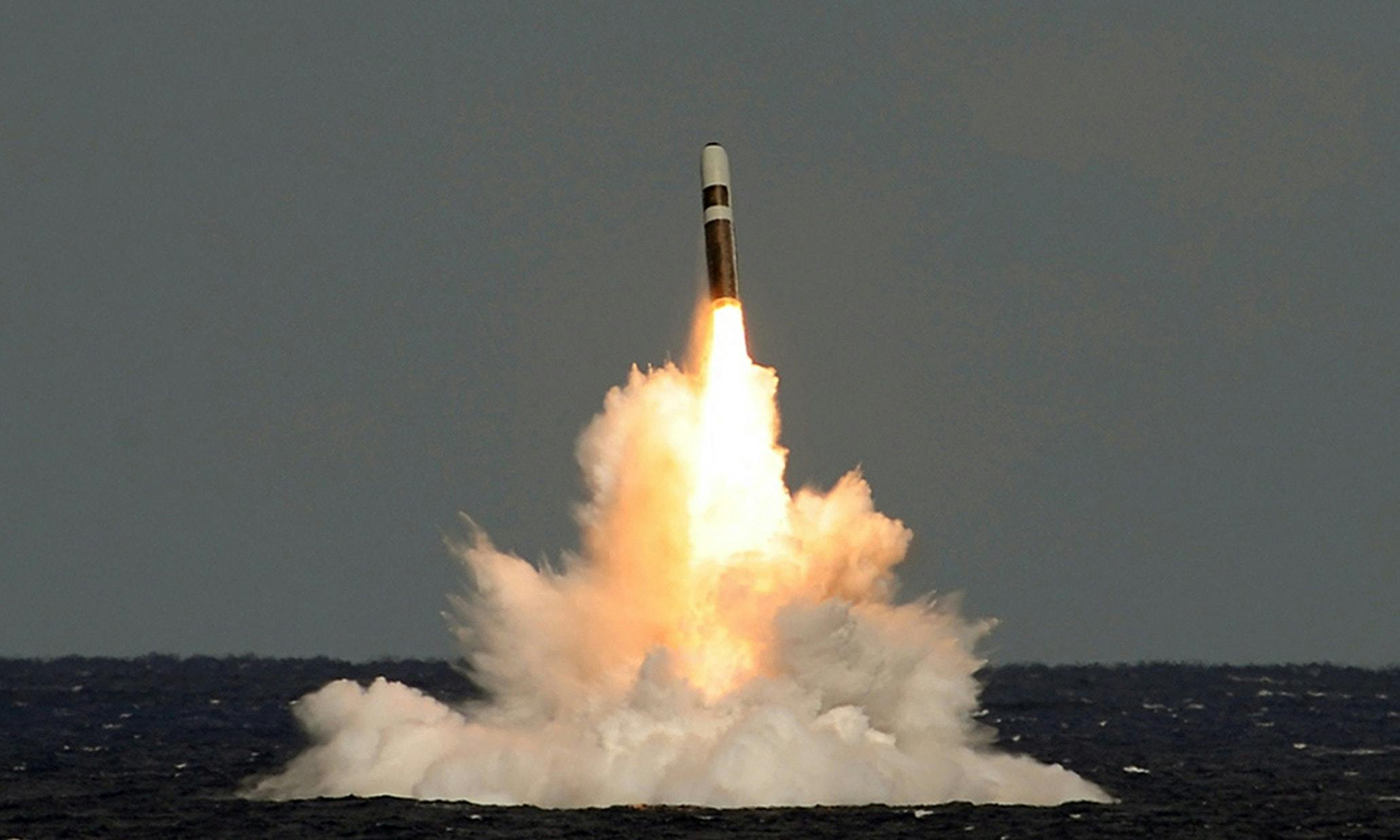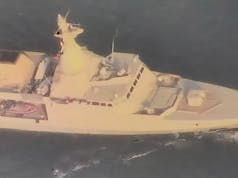The Ministry of Defence is facing a £2.9 billion black hole in its programme to renew Britain’s Trident nuclear weapons system, the National Audit Office has warned.
The National Audit Office (NAO) said the MoD is set to spend £50.9bn over the next 10 years on designing, producing and maintaining the submarines which carry the Trident missiles and their nuclear warheads.
The Trident missile system is housed on the UK’s four Vanguard class submarines which form the UK’s strategic nuclear missile force. Each of the four boats are armed with up to 16 Trident II D5 SLBMs, carrying up to 8 warheads each. Collectively, the submarines and the missiles are informally referred to as the ‘Trident weapons system’ as a whole.
The Royal Navy has operated the UK’s Continuous at Sea Deterrent since 1967 when the first SSBN – or Ship Submersible Ballistic Nuclear – HMS Resolution began patrolling armed with the Polaris missile system. In 1996 HMS Vanguard, the first submarine armed with the Trident missile system, arrived on the Clyde and took over deterrent patrol duties from the Resolution Class. The four Vanguard-class submarines form the UK’s strategic nuclear deterrent force.
With the programmes, referred to collectively as the Nuclear Estate, accounting for around a quarter of all defence equipment spending over that period, the NAO warned it could “destabilise” the entire equipment plan unless the “affordability gap” was addressed.
The NAO said that the MoD may be forced to make further inroads into the contingency fund, if it is to cover the additional £2.9 billion which it needs to find by 2028.
“Problems with the affordability of the Enterprise could destabilise the department’s overall equipment plan given that around a quarter of its planned spend on equipment relates to nuclear programmes,” the NAO said.
In the current financial year alone, the MoD is forecast to spend £5.2bn across the Nuclear Enterprise, accounting for 14% of the MoD’s total budget.
It includes £1.8 billion on procuring and supporting submarines, £1.4 billion on missiles and warheads, £790 million on propulsion systems, and £220 million on managing the Enterprise.
The concluding remarks of the report, which can be found here:
“Our 2008 report on the nuclear deterrent recommended that the Department address significant risks, particularly around costs, skills, commercial relationships and delivery to schedule. Some of these risks remain 10 years later. In the last 18 months, the Department has made some positive changes to the way it manages the Enterprise and has agreed commercial arrangements designed to improve cost and performance. However, the coming years are crucial.
As the Department invests heavily in the Dreadnought-class submarines and more widely across the Enterprise, it needs to ensure that the new structures, processes and its workforce operate effectively together to maintain the nuclear deterrent. We plan to review aspects of the Enterprise further as these arrangements evolve.”
For the UK Defence Journal, one of the most common myths around the system we have to deal with is the idea that the United States has control over the UK’s Trident missile system, that is not the case. The UK does rely on the US for the heavy maintenance and long term support of the system. For example, the British missiles are serviced at a port in the Georgia, US, and some warhead components are also made in America.
This is why the use of the word ‘operational’ is significant, while the UK can fire without permission, the system would likely not be sustainable without US support beyond a few years.
One common argument is that the US can simply ‘turn off’ the GPS system and therefore can stop the UK using Trident, this is also a myth, Trident isn’t guided by satellite. The missile uses a kind of stellar sighting guidance system and inertial navigation to take a reading from the stars to work out the missile’s position and make any adjustments necessary. They do not require GPS.
One source for the confusion could be the fact that, aside from those currently deployed, the missiles are held in a communal pool at the US Strategic Weapons facility at King’s Bay, Georgia, USA where maintenance and in-service support of the missiles is undertaken at periodic intervals. The missiles are jointly maintained, this is much cheaper than the UK doing it on its own and does not give the United States control over any of the weapons deployed on the submarines.

Does the system require American codes to launch?
American operated Trident missiles are controlled through the US Navy chain of command by the US President. ‘Permissive action link technology’ prevents anyone other than the president or someone he has delegated control to authorising a launch.
In 2007, the UK Government revealed that its nuclear weapons were not equipped with Permissive Action Links. Instead, the UK’s nuclear bombs to be dropped by aircraft were armed by just inserting a key into a simple lock similar to those used to protect bicycles from theft, the UK withdrew all air-launched bombs in 1998. The current UK Trident warheads can also be launched by a submarine commander with the support of his crew without any code being transmitted from the chain of command.
The British missiles are controlled through the Royal Navy chain of command all the way up to the Prime Minister. In reality the Prime Minister would make the launch decision in concert with whatever was left of the British government. The key point here is that the British deterrent does not have permissive action link control, which means it does not rely on the use of codes to fire the system. The UK’s Trident fleet relies purely on military discipline to prevent a launch.
In summary, the UK retains full operational control, to the extent that the US could not stop the UK from using the system, even against the United States.















[…] post Trident renewal faces £2.9bn black hole warns National Audit Office appeared first on UK Defence […]
I believe “Dithering” is the operational term here…
Cheers.
“The NAO said that the MoD may be forced to make further inroads into the contingency fund, if it is to cover the additional £2.9 billion which it needs to find by 2028.”
OK, so given the program costings included a £10bn contingency fund is this an actual black hole yet or is it simply an admission that more of the contingency fund will be needed? Hopefully the balance in the contingency fund hasn’t already been reduced to £7.1bn or less.
If this is simply an announcement that more needs to be taken from the contingency fund then obviously that’s not great news, getting to the end of the program with all £10bn of the fund intact and able to be spent of other assets would have been the dream outcome, but if it is as I asked above then this headline seems more like clickbait than an accurate summary of the situation.
That should read “Hopefully the balance in the contingency fund hasn’t already been reduced to £2.9bn or less”.
Perhaps they could find the funding here…
http://www.foxnews.com/science/2018/05/22/autonomous-vehicle-helped-locate-holy-grail-shipwrecks-off-colombia.html
Cheers!
George Osborne decision to include trident renewal into the defence budget is what has caused these issues. But then again George Osborne always made stupid decisions….
Completely agree Peter. The nuclear deterrent should have its own budget or go back to being budgeted for the way it was prior to Osbornes decision. Otherwise it confuses defence spending.
And counting!
Time to crack out the Gosport ferry submersible squadron.
So why has it not been changed he has gone.
These are Political weapons and therefore should not be included in the defence budget.
This report is a total waste of time. Forecasting the next 10 years is laughable, With our rising defence budget, growing Navy and the £37Bn black hole filled by Phil this is just peanuts, Oh sorry that was so last year.
But given the Civil Services and our leaders track record of bringing projects in on budget as a taxpayer I would suggest we accept a £2.9Bn shortfall as good news because it is more likely to end up at £12.9Bn.
Would not it be nice if the UK and France could get together in a Nuclear Deterrent co-operation along these lines. Build 6 new subs to one shared design-3 each and reach a suitable agreement to cover each others back when necessary during non availability due to maintenance etc.. This would provide a double saving-the bigger run of 6 units to cover fixed costs and the reduction of the fleet to 3 units each with the resultant economy in build and operation.
It would Geoff, but it’s a dream really, for various reasons. The US would veto any sharing of U.K. technology with France. Then operationally, could the French, for example, rely on a British submarine launching a limited preemptive strike on a Russian second city as Russian troops were about to overrun France? Or vice versa? Mmm…
It’s an excellent idea. I’m no expert but it seems to me that your (Richard’s) first concern is a good one but possibly not the second one.
UK & France both need 4 subs in order to guarantee 1 on station all the time because subs need to go into refit, there needs to be training, there is an overlap as one sub deploys while the active one needs to stay on station until the deploying sub is ready to go active, and general provision for a failure. The question is, if some of that was pooled, would we need 8 subs to ensure that there was always one French crewed and French controlled and one UK crewed and UK controlled sub active all the time? We would need 2 straight away for the active French and UK subs but beyond that what economies and overlaps (e.g. making sure that French and UK changeovers of active subs never happened at the same time) might be possible to reduce that “back office” number of subs from 6 down to maybe 4 or 5 to give the total of 6 or maybe 7 total fleet size that Geoff suggests.
With the cost of these things even 1 sub off the total would be valuable and as Geoff says economies of scale should reduce the unit cost of the subs if 6 or 7 of the same design are built vs only 4.
I am imagining the French deterrent will be used and influenced by the needs of the EU. Do we really want to be in a position where one of our boats may be asked to fire on behalf of an organisation that we are no longer part of and may not agree with? I could see the potential for massive diplomatic issues there.
I agree to savings made from jointly developing and building the subs, but not operating them jointly. And if we are talking savings, surely it would then be best to go in with the USA to get the best economies of scale.
However, how much did we learn from the Vanguards that then went on to aid the development of Astute? We have one of the best in the world from that. Successor is likely to be truly awesome, and again will inform the designs for our next SSN, helping it be a world beater and keeping our edge. If we share development, we loose our edge. And no matter how much Successor costs, I bet a very large part of it comes back into the Chancellors pocket.
“Do we really want to be in a position where one of our boats may be asked to fire on behalf of an organisation that we are no longer part of and may not agree with?”
Well, if the scheme I was suggesting was ever implemented then that could never happen. I confess though that your concern about Vanguard expertise possibly feeding into what makes Astute so great and the potential of compromising the ability of the UK to keep that edge in the future did strike a particular chord with me. Maybe this stuff is too critical and cutting-edge to ever consider any sharing.
Thanks for comments Julian and Richard-Regards from Sunny Winter Durban-26 degrees C !!